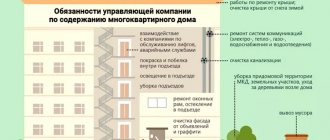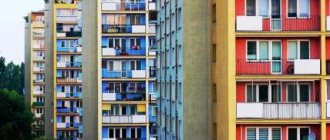List of responsibilities
The Housing Code of the Russian Federation does not officially indicate such a position as building manager . Therefore, neither the rights nor the duties of the chief are spelled out anywhere. Each building may have its own regulations, which are determined by the owners. However, as a basis, always use a roughly identical list of responsibilities:
- control over compliance with sanitary and hygienic standards in residential premises and in the local area;
- informing owners about meetings and fundraising for repairs;
- informing residents regarding their rights and responsibilities within the building;
- providing contact numbers and addresses of the main emergency services and housing organizations;
- checking the condition of repair work;
- assessment of the need for major or cosmetic repairs;
- protection of the rights of owners before the housing authority in case of their violation;
- assistance to emergency services (ambulance, gas, fire brigade) and investigative authorities;
- storage of keys to the technical premises of the building;
- storage of important housing documentation;
- creating reports and sending them to the housing authority at the end of each period (usually a year).
Important! The list of responsibilities can be influenced not only by residents, but also by the management company, to which the building’s chief must report and may receive wages.
There is such a position as entrance senior. The responsibilities of the entrance manager are not much different from the work rules of the building manager; it is also advisable to pay the employee. Only the sphere of influence is narrowed - the entrance, not the house. The senior staff at the entrance report to the building manager.
The head of the legal department, Vladislav Frolov, answers:
The position of “house manager, entrance manager” is not provided for by the current Housing Code of the Russian Federation. Usually the elders in the house and entrance are elected at a meeting of owners of residential premises. At this meeting the scope of their powers is determined. If the general meeting establishes that elders can collect information about residential water and electricity consumption data, then they have the right to do so. Please note that information about the election and scope of powers of the elders is entered into the minutes of the general meeting.
Is there any benefit to concluding a direct agreement with RSO?
Instructions: how to gather and hold a general meeting of residents
However, as practice shows, such people do not have the right to collect such information. Therefore, find out from the administration of your municipality whether there is a regulation on elders in the house and entrance, approved by the subject of the Russian Federation where you live.
Ask the senior person at the entrance for the minutes of the general meeting of premises owners on her election. It should indicate how much authority is granted to her. If there is no right to collect information about water and electricity consumption data, you can legally not provide anything to her.
Manager rights
Along with the responsibilities, the head of the building receives a number of rights. They are provided to enable the employee to do his or her job.
Powers of the house elder:
- providing assistance to residents in paying utility bills (paying debts, etc.);
- taking action against apartment owners and tenants who violate the rules of residence;
- initiation of major or cosmetic repairs, any positive changes regarding the maintenance of the building;
- requesting important information from the housing authority;
- convening a council of owners.
Since the list of rights and powers of the building manager is not regulated anywhere , residents can add or remove some items.
- the right to be elected to the house committee;
- right to utility discounts (see below).
Salary of a house supervisor
Since the law in the Housing Code (LC RF) does not provide for the position of a housekeeping supervisor, the employee’s remuneration is not specified anywhere. An employee can either work for free or receive a fixed salary.
Important! It is better if the person in charge of the house has the motivation to perform his duties competently and conscientiously. Few people would want to take a position that carries the risk of administrative liability and is not paid in any way.
The activities of a senior can be paid in two ways:
- at the expense of the building's residents;
- at the expense of the management company.
In the second case, the elder faces several problems at once. By becoming an employee of the management company, he ceases to fully represent the interests of residents and in many cases is forced to take the side of management. Also, the head of the house receives a very modest payment: 50% of the official salary goes to cover income taxes.
Important! It is more convenient if residents chip in to remunerate the person in charge of the house. Collective payment for the work of the elder must again be done through the management organization of the house. It is necessary to ask to officially include in the estimate of utility costs the costs of maintaining a senior in the house.
You can replace an employee’s monetary reward with discounts on housing and utility bills. The house elder does not pay for:
- concierge services;
- intercom operation;
- services provided by the concierge.
There are cases of combination: the senior receives both discounts and wages. The exact procedure and method of remuneration is determined individually, based on the decision of the majority of residents.
The procedure for electing a house manager
The building manager is elected at a general meeting of owners. He can be elected remotely or directly. Most often, a candidate is directly elected when the owners gather in one room and discuss the current issues of the house and how to solve them. But remote voting is also acceptable, in which residents simply put their signatures on the survey form.
Important! Only the owner of one of the apartments in the building stock can become a building manager (or a senior building manager). According to the Housing Code, tenants cannot participate in basic management issues. Their votes are also not taken into account when voting on the choice of house manager. The tenant's opinion can be taken into account if he acts on behalf of his landlord (a supporting document is required).
- A meeting of owners is scheduled. Turnout should be as high as possible.
- A vote is taken to appoint a senior person for the entrance or house. Only homeowners vote.
- By general voting (the signatures of residents left during a remote referendum are also taken into account, but the tenant’s opinions are not relevant) the best candidate is selected. It is desirable that the candidate has experience in contacting the housing office on general housing issues, is older, actively participates in social activities and has good contact with residents, as these qualities are required for a manager.
- If one of the candidates received more than half of the votes of all owners, a protocol is drawn up on his appointment to the position of senior. The housing office must be notified of the choice of the building manager.
- If a sufficient number of votes are not obtained, the election procedure may be repeated at the next meeting.
- At the election meeting, it is recommended to immediately determine the size of the salary of the building manager, because after the election, you need to submit documents for salary registration through the management company.
The protocol is stored in the housing office; from the moment of election, the house manager performs the above duties and has the indicated rights. During the election, the meeting decides for how long the candidate is elected. At any time, the collective of residents can re-elect the elder if he does not meet their requirements.
Protocol, re-election, characterization - how to choose a senior person in the house?
Elections – we often associate this word with the president or the State Duma.
However, there is one more activity, the results of which directly determine the improvement of your home and yard. This is the choice of the elder in the house. How to choose and is it possible to re-elect a senior person in an apartment building? What is aniye? Who can participate in it? How to become the head of the house? Is it possible to organize early elections?
Let's look at these questions in detail.
How to organize elections?
House elder is a person who represents the interests of apartment owners.
Therefore, it is logical that it is chosen by apartment owners, and not by someone from the outside.
The decision on who should hold such a position is made at a general meeting of owners.
On it, everyone can vote for any candidate.
To make a decision, it is necessary that more than 50% of the owners of the entire area of the house be present.
ATTENTION! There are cases when the Management Company appoints a house manager on its own. This often happens due to a lack of initiative among residents. Naturally, such an appointee will primarily pursue the interests of the company, and not the residents.
If this happens to your home, then you can refuse its services by initiating an election.
When should you be re-elected? How many times can you be “senior”?
The concept of re-election of a senior has rather vague formulations - after all, this is not the post of president of the country. However, there are several conditions for the candidate. How to change the person in charge at home? You will be able to take this position if you meet the following requirements:
- be the owner of one of the apartments;
- have a reputation as a capable and responsible citizen;
- obtain the support of the majority of owners;
- be over 18 years old.
For how long is the elder elected?
And how often should re-elections be held?
The term for electing the house elder and his powers is determined by the meeting of residents.
You can elect a “head” for one year, but often this period is at least 2 years - few people want to waste time on the next election.
REFERENCE! The duration of powers must be specified in the charter of the self-government body. It is worth noting that the period cannot exceed 2 years - after this period an analysis must be carried out.
How many times can a person be re-elected to such a post? This is not stated anywhere in the law or regulations and no document confirms this. The Housing Code also does not include such information.
Therefore, if a person meets the requirements listed above, he can be re-elected an indefinite number of times. This often happens. A smart organizer holds office for 20 or even 30 years, periodically winning formal elections.
Order of conduct
The election of a senior person in an apartment building is held exclusively among apartment owners.
The standard procedure is the organization of a general meeting of owners. A meeting for elections can be convened either after the expiration of the term of office or for other reasons, including due to a large number of complaints.
For the legality of the anniya, an appropriate quorum is required - the presence of owners of more than 50% of the total area of the house.
At the meeting, the candidate is considered and an election is held.
The results are entered into the final protocol of the election of the house elder.
An alternative option is distance learning. Essentially, these are the same elections, only they are held using ballots that residents can fill out over a certain period.
The ballot will contain a proposal with options, as well as a clear time frame for the elections. At the end of the term, the chairman sums up the results and draws up a protocol , after which the results are reported to the residents of the house, and the elected citizen takes office.
IMPORTANT! Apartment owners, and not just residents, take part in the survey. If you rent an apartment or live in it under a social rental agreement, then you cannot participate in the elections.
How to fill out a sample protocol?
The document on the selection of a house elder is drawn up and signed by the chairman and secretary of the meeting, who are elected before the meeting. The sample protocol includes several mandatory points:
- exact address of the house;
- data on the total area and the number of owners present; information on the number of owners must be indicated as a percentage of the total area - only in the presence of more than 50% of the owners will the meeting be considered legal;
- agenda - choosing a house leader;
- information on the selection of the chairman and secretary;
- information about candidates;
- analysis results indicated as percentages;
- the outcome of the meeting, whether a decision was made on the appointment.
Another point that should be indicated in the protocol is the place where it will be stored.
Do complaints affect early shifts?
Often the manager does not meet the expectations of residents, fulfilling his duties “carelessly.” The reasons may be different: lack of time, desire, and often experience in solving organizational issues. Is it possible to deprive the “fare-manager” of his powers and conduct an early resignation? Of course.
Re-election of senior
Re-election to a leadership position is carried out if the current building manager does not fulfill his duties correctly, evades their implementation, or does not fulfill certain (within the law) wishes of the residents. Also, the society of owners can re-elect the chief if it believes that a more suitable candidate has appeared for the post.
Important! An example of a reason for re-electing a leader is that the house manager unlawfully used the money collected for major repairs.
The procedure for re-election is the same as the procedure for elections. The difference is that the issue of removing the current leader from his post must first be resolved. If residents decide that a person is truly unable to cope with his responsibilities and needs to be replaced, a standard election is held. The senior is given a payment in accordance with the date of dismissal, the keys, general packages of documents and other attributes of the building manager are taken from him.
Termination of powers of the council of an apartment building
The powers of the council of an apartment building are terminated upon its re-election at a general meeting of owners or upon election of the board in the case of the creation of an HOA (Part 9 of Article 161.1 of the Housing Code of the Russian Federation).
When is the house council re-elected?
The house council is re-elected in case of expiration of the term of office or early - in case of improper performance of its duties.
The term of office of the council is determined by the general meeting. If the period is not set, then the “default” is two years. If at the meeting the owners did not decide to re-elect the council of the apartment building, then its powers are extended for the same period (Part 10, Article 161 of the Housing Code of the Russian Federation).
In practice, early re-election (pre-election) occurs in cases of sale of the premises of council members (termination of ownership), death, or refusal of membership.
Is it possible to re-elect the council early if you don’t like it?
The council can be re-elected early if it performs poorly. Dislikes alone are usually not enough. It is better to confirm the improper work with something, otherwise the court may satisfy the claim of the owners from the old council and declare the meeting’s decision on early re-election invalid.
Examples:
Appeal ruling of the Omsk Regional Court in case No. 33 – 5593/2015: “the law prohibits the unjustified early termination of the activities of the elected council of the premises of an apartment building, the powers of which are terminated only upon the expiration of the validity period established by the general meeting. At the same time, it is impossible to change the term of office itself before the expiration of the specified period.”
Appeal ruling of the Supreme Court of the Udmurt Republic in case No. 33 – 4719/2015 : “circumstances confirming the improper performance of its duties by the council of an apartment building have not been established in the case.”
Appeal ruling of the Sverdlovsk Regional Court in case No. 33 – 12587/2018: “The issue of re-election of the MKD council and termination of the powers of the current MKD council due to improper performance of its duties was not put to a vote, and it was not indicated what exactly the improper performance of duties consisted of. Thus, the general meeting made a decision on the issue of electing a new MKD council without any grounds, that is, illegally.”
Sometimes the court does not go into such details and leaves the decision of the general meeting in force, even if the initiator of the meeting did not justify the reasons for the re-election of the council. These are, for example, the appeal rulings of the Stavropol Regional Court in case No. 33 – 6485/2019 and the Moscow City Court in case No. 33 – 8618/2019. In the first case, the court chose not to notice the argument about the groundless early termination of the powers of the council, and in the second, it was satisfied that the decision of the meeting contained a reference to Part 10 of Art. 161 of the Housing Code of the Russian Federation: “The legislation does not establish requirements for including separately in the agenda the issue of improper performance of duties by the Council of MKD, as well as requirements for the provision of such information in accordance with Art. clause 5, part 5, art. 45 of the Housing Code of the Russian Federation... This issue is referred by the housing legislation of the Russian Federation to the competence of the meeting of owners, who, when making a decision on the early re-election of the council due to improper performance of their duties, proceed from their own assessment of the actions (inaction) of the house council.”
This is the tenth post in a series of posts about home advice. Previous nine:
- House advice in a house with an HOA
- Apartment building council in practice (survey results)
- Recommendations for aspiring house council members
- Election of the council of an apartment building
- Rights and obligations of the council of an apartment building
- Chairman of the House Council: rights and responsibilities
- Regulations on the council of an apartment building and the report of the council of apartment buildings
- Protecting the honor and dignity of the chairman of the MKD council
- Remuneration for members of the council of an apartment building (chairman)
What are the rights and responsibilities of a house elder in 2019?
Issues of managing an apartment building are enshrined in Art. 161-165 of the Housing Code of the Russian Federation. However, there is no such definition as a senior housekeeper in an apartment building (MKD) in it or in any other legislative act. However, it is used in many legal documents of local authorities. And in the absence of general instructions on this matter, job responsibilities are developed individually in individual localities. Over time, such documents in different territorial objects began to resemble each other, and general trends emerged.
What to do if the elder in the house does not fulfill his duties, but does not intend to leave
Residents of a Blagoveshchensk high-rise building contacted the editor because they had not been able to replace the chairman of the building’s council for several years.
Doing nothing
— It so happened that we were not the ones who chose the eldest house: almost half of the owners in the house have already changed. We know that Svetlana Anatolyevna was unemployed for a long time and, on her own initiative, began to resolve various general house issues with the “manager,” said our reader Olga . “Later she went back to work and actually stopped doing this, but she is still listed as the chairman of the house council. We know that she has some benefits on utility bills and even, they say, receives money from resource supply companies. And a couple of years ago, the entire entrance lost its renovation, while new double-glazed windows appeared on Svetlana’s floor.
According to Olga, residents decide on landscaping the yard and entrance independently, without the participation of the so-called elder. Several times the board of owners wanted to re-elect her, but each meeting ended in a scandal - the woman clutched her heart and called an ambulance. Olga and her neighbors are wondering whether it is possible to elect a new senior house without the consent and participation of the previous one?
Not everyone gets paid
— The chairman of the house council acts as a liaison between residents and the management company. His task is to represent and protect the interests of the residents of the house in legal relations with service organizations. The chairman is elected by the general meeting of owners,” explained lawyer Victoria Myasnova. — The senior house does not have any benefits as such, however, the management company itself can provide discounts on services, but this is a special case. The owners themselves at the general meeting also have the right to decide on any payments to the chairman - again on their own initiative. This is why people without much enthusiasm become chairmen of house councils: there are responsibilities and duties, but there are no guaranteed bonuses.
How to change?
If the owners are not satisfied with the work of the chairman of the house council, anyone who is ready to take on these functions can replace him if more than two-thirds of the owners vote in his support. But initially, the owners must vote for the resignation of the current chairman. At the same time, according to the Housing Code of the Russian Federation, the meeting must have a quorum: owners with more than 50 percent of the total votes must take part in it. The decision of each meeting is documented in minutes.
Important
The voice of the owner is not the owner himself. Part 3 Art. 48 of the RF Housing Code establishes that each owner has a number of votes in proportion to his share in the right of common ownership of common property. The method of counting votes is also established by the general meeting, the main thing is that it does not contradict the law. Many HOAs use this scheme: one vote is equal to 1 sq. m. meter of the total area of the premises owned by the owner, and 100 percent (total number of votes) is taken to be the total area of the premises owned (usable area excluding the area of common areas). These numbers can be found in the documentation for the house or on the Housing and Communal Services Reform website in the “My Home” section.
Who is the house eldest?
This is one of the owners of the premises in the apartment building, who was elected by the others to protect common interests, endowed with responsibilities and inalienable rights. He defends the interests of residents in the Criminal Code. Who can become a house elder is determined by the instructions of the local administration. The process of its appointment and the features of its activities are also explained there. The person in charge of the house is also called the house manager, the chairman of the council of the apartment building. He must be respected among residents, a responsible, organized person who has basic legal knowledge.
Senior at the entrance
Such a “position” also occurs in a high-rise building (at the discretion of the residents). The responsibilities of the entrance supervisor in apartment buildings are identical to the responsibilities of the building manager, only the former is in charge of a separate section of the house. The powers are practically the same, but on a different scale.
He must also be proactive and help the manager on all issues within the framework of the part of the apartment building entrusted to him. It is elected only by the owners of the apartments of a particular entrance; a decision on this is made at a general meeting by a simple majority of votes. This simplifies the work of managing the house, brings coherence and efficiency.
Ivan Iutin, managing partner of JSS Iutin, Belousova and Partners, answers:
The Housing Code does not provide for such a concept as a “senior in the building.”
Accordingly, there is no need to talk about clear legislative regulation of his rights and obligations. However, the owners of apartments in apartment buildings at a general meeting can choose one of the owners and give him certain powers, for example, to represent their interests before third parties. Management company: what is important for everyone to know about its work
How to choose the right management company
To know for sure, you need to familiarize yourself with the documents on the management of apartment buildings (decisions of general meetings of owners of apartment buildings, management agreement). If the “senior at the entrance” was approved by a decision of the general meeting of owners, the protocol must also contain the range of rights and responsibilities of such a person. Or, by decision of the owners, a separate document could be approved regulating the activities of the elder.
Collection of meter readings by “seniors at the entrance” may be necessary in the case of direct management of apartment buildings, when the owners pay resource-supplying organizations directly, bypassing the management company.
Meter readings cannot be used against you. However, you are obliged to provide them only if the corresponding obligation is provided for by a decision of the general meeting of owners.
What rights and responsibilities does it have?
The head of the house has a special status. He must perform the work assigned to him, while having additional rights. Main responsibilities of a house manager:
- ensuring the cleanliness of entrusted public areas;
- implementation of compliance with contractual conditions by housing maintenance authorities (improvement, cleaning, repair of entrances to apartment buildings);
- monitoring compliance with property operation standards and taking care of its safety;
- explanatory work on issues related to common property;
- providing information about institutions liquidating accidents;
- participation in resolving conflict situations in cooperation with the Internal Affairs Directorate;
- organizing assistance to low-income families together with social protection authorities;
- responsibility for safe exits (electrical panels), ensuring the safety of the keys to them;
- maintaining documentation about the work and appeals of citizens, preparing annual reports;
- control over the implementation of operational, fire, sanitary, and environmental requirements in the entrusted territory.
The house manager assists the relevant authorities (Ministry of Internal Affairs, fire protection, energy service, etc.) in implementing preventive measures. The head of the house has the rights:
- submit a request to the Criminal Code for the Prevention of Emergency Situations;
- make proposals for the safety of common property;
- evaluate, together with representatives of the management company, the results of the work performed and draw up appropriate acts;
- hold meetings;
- establish measures of influence on citizens who violate community standards;
- be elected to the MKD council or house committee.
These are fundamental rights. Where the apartment building is located is important, and the responsibilities of the house elder differ depending on this . In each region the list can be updated and new items added.
Foreman in the house and entrance, his rights and responsibilities, salary and benefits
04.03.2018
Frequent clashes of interests between building residents and operating organizations contributed to the introduction of the position of a house (entrance) foreman in order to more effectively and efficiently resolve controversial issues. Performing the functions of a senior person gives the resident rights and responsibilities that are different from the rights and responsibilities of other residents of the house.
Who is the “elder of the house” or the entrance, what is the correct name for such people, their legal status
The current housing code does not contain such concepts as a house manager (popularly known as a house manager), a house manager or a house manager. At the same time, such persons exist and their legal status is enshrined in local regulations at the level of territorial self-government bodies.
In fact, the senior person in the house is one of the residents of the house , to whom the other residents, in accordance with the procedure established by local instructions, have delegated the right to represent their interests before the HOA or housing cooperative, or the management company (management company). You can find out who exactly they are in your home or entrance by contacting one of the above-mentioned organizations.
A specific list of powers vested in the house elder and other issues related to his activities is prescribed in local instructions and is individual for each administrative-territorial unit. You can find out what exactly the position of a senior officer includes by studying the instructions in force in a given locality.
However, a number of provisions will be present in the instructions of all administrative-territorial units. In particular:
- General provisions that determine who the senior person in the house (entrance) is, how he is appointed and who he is subordinate to;
- Legal status: rights and responsibilities of the elder in the house;
- The liability that a house manager may incur and its grounds.
Rights, duties and responsibilities
The house manager has a special legal status compared to all other residents of the house, and he is granted certain powers.
So, the responsibilities of the house elder include:
- Carrying out ongoing monitoring of the quality and regularity of cleaning of all public facilities (staircases, elevators, etc.) and local areas, including checking the quality of snow removal in the winter;
- Monitoring the activities of organizations operating the housing stock in matters of their fulfillment of obligations assumed on the basis of contracts - cleaning, landscaping, etc.;
- Control over current or major repairs;
- Monitoring compliance with standards in the field of hygiene, sanitation, ecology, fire safety, the quality of disinfection, including assessment of the living conditions of cats, dogs and other pets;
- Taking measures aimed at eliminating violations in the use and maintenance of the common property of the house;
- Proposal and implementation of ideas and solutions for maintaining and ensuring the safety of common property;
- Explaining to residents their legal status in matters of maintenance and use of residential and non-residential premises and common areas;
- Bringing to the attention of residents contacts of operational institutions that may be needed in an emergency or other non-standard situation;
- Interaction with fire authorities to ensure proper fire safety conditions at home;
- Communication with social protection and health authorities when providing assistance to the poor and carrying out preventive measures;
- Communication with law enforcement agencies to ensure law and order and prevent domestic violence.
Storage of keys to emergency exits, utility rooms, service rooms, technical rooms (with the exception of electrical panels and starting rooms), and maintenance and storage of logs with minutes of meetings of owners, recording of residents' requests, passports for apartment buildings, etc. is also the responsibility of the house elder.
At the end of the year, the building manager reports on the work done and presents the relevant documents to the general meeting of residents.
Responsibilities of the entrance supervisor
In fact, the responsibilities of the entrance supervisor and the responsibilities of the house supervisor in an apartment building are identical, the difference is only in scale.
Rights of the elder in the house
The elder in the house has the right:
- Request information from various authorities and send demands to the management organization to eliminate violations in the area of accepted obligations;
- Offer options for improving the maintenance and use of public facilities, as well as repair work;
- Control the expenditure of funds intended for the repair and maintenance of home property;
- Participate in the calculation of payments for housing and communal services;
- Indicate to the management organization the need to carry out major repairs of the property of the house;
- Evaluate the quality of services and work of the management company, participate in the acceptance of work performed with the preparation of reports;
- Contribute to the provision of social influence on residents who violate the rules of housing use;
- Initiate the convening of a general meeting of residents;
- Can be elected as a member of the district house committee and “district elder”.
Choosing a building manager
The position can be introduced at the suggestion of any of the owners. The election of a house elder with the drawing up of minutes is ensured by a general vote of the owners at the meeting. At least 2/3 of the number of owners of apartments in the apartment building must participate in it. An applicant for the position needs to collect 50% plus one vote. Tenants do not participate in voting. Absent owners have the right to vote in absentia. Those who did not take part in the elections are subject to the decision of the meeting.
Job description
When setting a salary, the management company enters into an agreement with the head of the house on joint activities. The document is based on the minutes of the meeting and contains:
When and for what term is the MKD council elected?
The council of an apartment building is an elected body that includes the owners of premises in the apartment building. He is elected at a general meeting of owners and performs the functions of monitoring the maintenance and repair of the house (part 1, 5 of article 161.1 of the Housing Code of the Russian Federation).
The council must be elected in buildings where there are more than four apartments and no TSN or HOA has been created. If the owners themselves do not do this, then the council must be elected on the initiative of the local government body (Part 2 of Article 161.1 of the Housing Code of the Russian Federation).
The Council is elected once every two years, unless otherwise established at the general meeting of owners. If the owners do not make a decision to re-elect the council, then the previous composition continues to work for another two years. If the council does not perform its duties properly, the council may be re-elected early (Part 10, Article 161.1 of the RF Housing Code).
The number of people on the MKD council is approved by the owners at the OSS. Neither upper nor lower limits on the number of council members are established by law (part 4 of article 161.1 of the Housing Code of the Russian Federation). From among the members of the council, the chairman of the council of the apartment building must be elected, who manages the activities of the council (parts 6, 7 of article 161.1 of the Housing Code of the Russian Federation). How the Council of Apartment Buildings can be useful CC 8847 3
Payment of wages
This is not regulated by law. The person in charge of the house receives a salary or compensation for utility bills . Sometimes socially active persons take on the described activity on a voluntary basis. The management company can enroll such an employee on its staff and determine the method of remuneration. To do this, at a meeting of citizens, a petition is signed to the Criminal Code to introduce this position into the state and determine the amount of earnings.
Who appoints and pays salaries?
The method of remuneration and its frequency is established at the general meeting. There are two options: either residents collect funds on their own or benefits are provided in the form of reduced utility bills.
What benefits are provided?
Local authorities provide privileges for the head of the house. For example, according to Moscow Government Decree No. 328 dated April 13, 1999, the building manager has a 100% exemption from fees:
- for the work of the concierge;
- for using the intercom;
- for waste disposal.
The list of benefits is not established by law. But at the initiative of residents, they can be introduced on an individual basis.
Responsibility for failure to perform one's functions
The building manager must periodically (reflected in the contract) report to residents on the work done . Those who elected him have the right to know about the quality of the duties he performs. It doesn't always live up to expectations. Sometimes there is even a dilemma about where to complain about the elder in the house. Conflict resolution is practiced in stages when contacting the authorities:
Of course, matters rarely reach the final authority. The main issues are resolved in the management company, where a report on the work of the elder in the house can be used as evidence. If a violation of duties is established, the employee may be held accountable - administrative or criminal (decided by the court).






